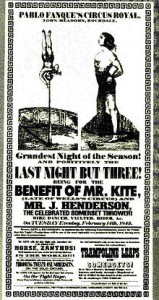I’m setting a criteria here. These are not showtunes redone by rock bands, or songs written for theater productions. They’re stand-alone rock songs meant to be played in rock clubs by established rock bands… inspired by plays.
1. “Desdemona” by John’s Children. A vague lyric which certainly doesn’t say anything that suggests it’s NOT about Othello’s ill-fated spouse. The shouty refrain “Des-de-MO-na! Lift up your skirt and fly” will affect how you hear that name spoken forever onwards. The band John’s Children (which had a pre-T. Rex Marc Bolan in its ranks for a few months) also did a song called “Midsummer Night’s Scene.”
(There’s also apparently an Allman Brothers song called “Desdemona,” but I could never bring myself to listen to an Allman Brothers song, not even for theatrical research. Sorry.)
2. “Waiting for Godot.” The Coctails. Ironically impatient rave-up that yelps “Don’t you know we are waiting for Godot?” Does in 2 minutes, 13 seconds, what Beckett takes two hours to accomplish.
3. “Antonin Artaud,” Bauhaus. The proto-Goth band’s bracing and exhausting tribute to the Theater and Its Double is more about a playwright/essayist than a particular play, but David J. Haskins’ lyrics brilliantly conflate Artaud’s staging theories with Artaud’s life. The closing chorus is “Those indians wank on his bones,” a reference to Artaud’s time studying the performance rites of the Tarahumara in Mexico.
4. “Sincere,” Freedy Johnston. Fast-paced acoustic rocker from the celebrated singer-songwriter’s breakthrough album, Can You Fly? “Sincere”’s lyric explains the entire plot (such as it is) of Tennessee Williams’ fantasy drama Camino Real, analyzes some of the play’s central characters, and nails its symbolism.
They think the Yank is such a jerk
Well this clown hocked his golden gloves
He ran out all ripped apart
Holding that solid gold heart
5. “Dktr. Faustus,” The Fall. Many songs, and band names, namecheck the title character of the reatest play ever written. Even more invoke the name of Faustus’ enabler Mephistopheles. Again, that’s a list for another time. (This is still a brand new site. We’re just getting started here!) But The Fall actually has a vested interest in the plot of Marlowe’s original play:
Doctor Faustus! Power showing, spits out haycart, carthorse, hay and box at the gates of Anholt. Dr. Faustus! At the court of the count, made fruits exotic pleasure-licious, appear behind curtains in winter. (Bananas! Apples! Plums!)…
And so on, right up to:
Must leave his student friends.
Faustus! Come get yer chips!
Pull my blood silhouette through the ceiling sky.
6. “Lysistrata,” Utopia. Todd Rundgren’s prog band totally Cliffs-Notes the Aristophanes comedy, without much of a sense of humor perhaps, but with a solid beat and a whole other level of pacifism. The song’s male narrator doesn’t just give up soldiering because his beloved Lysistrata “won’t let me come inside/unless I don’t go to war no more.” His capitulation to make-love-not-war is articulated much more deeply than that:
Send the boys all back to the farm
Tell the troops it was a false alarm
‘Cause if I die I want to be in your arms
And so I won’t go to war, no I won’t go to war,
Said I won’t go to war no more.
7. “Just Like Romeo and Juliet,” The Reflections. Romeo and Juliet songs deserve their own list (some other time, when ‘m feeling mushy). But I’ll throw this one in here to start the ball rolling.
Ah, all right, now, I’m speculatin’
Wonder what tomorrow’s gonna really bring
If I don’t (if I don’t) find work tomorrow
It’s gonna be (gonna be) heartaches ‘n’ sorrow
Our love’s gonna be destroyed like a tragedy
Just like Romeo and Juliet
8. “Punch and Judy,” XTC. The classic puppet show has, like Romeo and Juliet, come up in constant songs. There’s a dreary and endless Marillion prog-jam called “Punch and Judy,” but the infinitely cooler XTC actually places the relationship metaphor within a theatrical context. Describing a real-life domestic abuse situation, the song asks “This must be make-believe, ‘cos who do we know, dear, who acts like that? Punch and Judy.”
9. “For the Benefit of Mr. Kite,” The Beatles. Famously inspired by a mid-19th century circus poster which John Lennon bought in January 1967 in Kent, England. For the most part, the characters in the song come directly from the poster.
10. “A Streetcar Named Desire,” A Thorn for Every Heart. Sometimes listed as just “Streetcar,” this 2003 emo catharsis by a five-piece from Chico Hills, California, pretty much sums up Tennessee Williams’ Southern angst without a single direct reference to a character or line from the play. It’s the kind of poem a depressed high school student might write after reading A Streetcar Named Desire in English class. Nice bass sound, though.
Submissions of similar theater/rock mash-ups gleefully welcomed. Send to chris@scribblers.us or just post as comments below.

